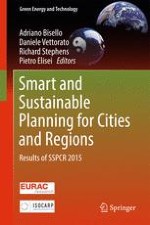2017 | OriginalPaper | Buchkapitel
Interregional Cooperation as a Key Tool for the Achievement of Strategic-Energy and Climate Targets: The Experience of the INTERREG IVC RENERGY and SEE RE-SEEties Projects
verfasst von : Carmelina Cosmi, Monica Salvia, Senatro Di Leo, Filomena Pietrapertosa, Simona Loperte
Erschienen in: Smart and Sustainable Planning for Cities and Regions
Aktivieren Sie unsere intelligente Suche, um passende Fachinhalte oder Patente zu finden.
Wählen Sie Textabschnitte aus um mit Künstlicher Intelligenz passenden Patente zu finden. powered by
Markieren Sie Textabschnitte, um KI-gestützt weitere passende Inhalte zu finden. powered by
